Spirals project by PartSuspended
In 2006, Hari Marini co-founded PartSuspended as a dynamic platform on which to foster performances, installations, writing and collaborations with other artists. For the Spirals project (2013-ongoing), Hari collaborates with female poets, performers, video-makers and musicians, and has filmed in a variety of places, such as London, Broadstairs, Coventry, Barcelona, Belgrade and Athens. Spirals is a poetic journey that crosses geographical borders and unites female voices in an exchange of languages, cultures, personal narratives and modes of expression. Through the symbol of the spiral, the project explores thresholds, migration, path, nature, home and sense of belonging; the spiral acts as a sign of becoming, transforming and awareness. www.partsuspended.com
PartSuspended – Hari Marini
Hari Marini is a director, independent writer, educator, and co-founder of PartSuspended group. Her practice and research are focused on poetics of spaces, performative architecture, and women writers. Her work has been published in Interim: A Journal of Poetry & Poetics, Contemporary Theatre Review, Performance Research, and Journal of Greek Media and Culture. She has presented work in the UK, USA, Greece, Czech Republic, Serbia and Spain. Hari has been teaching performance courses at Queen Mary University of London.
Poet – Beatriz Viol
Beatriz Viol (Barcelona, Spain, 1983) is a poet and social anthropologist. She is the author of two poetry collections. Los mapas perdidos (Lost maps, Diputación Provincial de Soria 2012) for which she received the XXVII Gerardo Diego Prize for unpublished poets; and Hallar la casa (Finding home, Endymion 2018) for which she won the Himilce Prize. Her work has been included in the poetry collection El árbol talado que retoña (El Páramo 2009). Beatriz has created the blog “La orilla de los pajaros” in which she hosts poetry in a variety of languages and shares her work. http://laorilladelospajaros.blogspot.com/
Translator – John London
John London is Professor of Hispanic Studies and Director of the Centre for Catalan Studies at Queen Mary University of London. He has published studies such as Reception and Renewal in Modern Spanish Theatre (1997), Contextos de Joan Brossa (2010), and (as editor) Theatre under the Nazis (2000), Contemporary Catalan Theatre (with David George, 1996) and One Hundred Years of Futurism (2017). He also works as a translator from several languages. Among his published translations is the edition of The Unknown Federico García Lorca (1996). John’s own premiered and published texts include You Know How These Things Are (1998), Right Couples (1999/2001), The New Europe (2000), and Nex (2005).
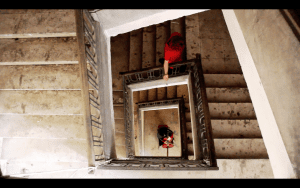 PISTAS PARA HALLAR LA CASA
PISTAS PARA HALLAR LA CASA
Lo importante no es la casa donde vivimos. Sino dónde, en nosotros, vive la casa. – Mia Couto
Parece que para que haya casa
tiene que haber árbol,
raíces, tronco, olor a tierra.
Han de brotar las ramas,
desprenderse las hojas.
Ha de pasar el agua cerca.
Tiene que caer la lluvia, llevarse el polvo,
secar el aire las hojas.
Para que haya casa
ha de haber tiempo para ordenar
y espacio para el desorden.
Han de quedar siempre
pequeños rincones por explorar, por ejemplo,
aquellos lugares donde se guardan
las palabras que aún no supimos decir.
Para que haya casa
hemos de llevar muy adentro
las casas que fueron los que ahora viven lejos.
Casa es también el lugar
donde nos permitimos llorar y dejamos
a las lágrimas alcanzar la tierra.
Habitar cuerpo, árbol, tierra, madre.
Soltar lluvia, aire, lágrimas, río.
Construir sueños, monte, amor, versos.
Hallar la casa.
Tracks for Finding Home
Translated by John London
The important thing isn’t the home where we live. But where home lives, within us. – Mia Couto
For there to be a home
there apparently needs to be a tree,
roots, a trunk, the smell of earth.
Branches have to sprout,
leaves to fall.
Water has to flow nearby.
Rain needs to come, taking the dust away,
the air needs to dry the leaves.
For there to be a home there has to be
time for tidying up
and space for what’s left untidy.
There always have to be
small corners left for exploration, like
those places where we keep
the words we couldn’t yet say.
For there to be a home
we have to carry deep inside
the homes that were the people who now live far away.
Home is also the place
where we let ourselves cry and let
the tears fall to the ground.
Living in body, tree, earth, mother and womb.
Releasing rain, air, tears, river.
Building dreams, woodland, love, poetry.
Finding home.
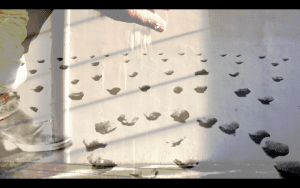
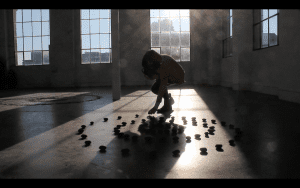
LOS PASOS DEL BAILE
Volver a transitar
los espacios que nos recuerdan
a las personas que amamos.
Es verano y vuelvo
a casa de mi padre.
Tomo clases de danza,
pero entretanto
volver a transitar
el tiempo cíclico
de los recuerdos.
Palpar, oler, escuchar
la esencia de lo que nos oprime el pecho.
Vaciar el armario de todo aquello
que ya no sirve.
Recolocar fotografías, abrir las ventanas
y entretanto
seguir construyendo recuerdos
en el espacio que nos pertenece.
Dejar que la vida nueva
se apodere
de lo cotidiano.
Steps for the Dance
Translated by John London
Travelling again
through the spaces that remind us
of the people we love.
It’s summer and I’m going back
to my father’s home.
I go to dance classes
but meanwhile I’m
travelling again
through the cyclical
time of memories.
Touching, smelling, listening to
the essence of what weighs on our hearts.
Emptying the cupboard of everything
that can’t be used any more.
Putting photos in different places, opening windows
and meanwhile
building new memories
in the space belonging to us.
Letting new life
take possession
of our daily existence.
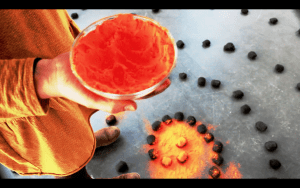
VISIONES DE LUZ
Tras las superficies opacas
imaginamos la luz.
Tras los templos sagrados
de las palabras calladas
la imaginamos.
Tras la siguiente esquina
del laberinto, tras sus grietas.
La luz que penetre el vendaje,
que pronuncie la herida,
que nos muestre su sombra.
La luz
que siempre llega
hasta el límite
de sus posibilidades.
Visions of Light
Translated by John London
Behind opaque surfaces
we imagine the light.
Behind sacred temples
of silent words
we imagine it.
Behind the next corner
of the labyrinth, behind its cracks.
The light that might cut through the bandage,
that might utter the wound,
that might show us its shadow.
The light
that always reaches
the limit
of its possibilities.

DESPUÉS DE PARTIR
A veces cuando sentimos miedo
viene el recuerdo de una plaza,
una iglesia,
un reloj que marca lentas las horas,
igual que en los lugares en los que nunca pasa nada.
Nuestro cuerpo siente frío
y echa de menos la hoguera,
y las noches en las que ir a dormir temprano,
bajo mantas pesadas y música de grillos.
A veces cuando sentimos miedo
nos ronda la cabeza
un pueblo,
aunque nunca hayamos tenido pueblo,
aunque seamos hijos de emigrantes,
viajeros, exiliados,
y naciéramos en un camino
que no hace más que perderse.
Un pueblo aparece a veces
en un lugar insospechado,
como en un poema,
y lo pisamos sin miedo,
más allá de la tierra mojada.
Lo cruzamos.
Somos de un camino
y de los pueblos que respiramos.
Seguimos vivos después de partir.
Los mapas perdidos (Diputación Provincial de Soria, 2012)
AFTER LEAVING
Translated by John London
Sometimes when we’re scared
we’re reminded of a town square,
a church,
a clock that slowly tells the time,
just like in places where nothing ever happens.
Our bodies feel cold
and miss the bonfire,
and the nights when we went to sleep early
wrapped in heavy blankets and the music of crickets.
Sometimes when we’re scared
a village comes
to mind,
even though we may never have had a village,
even though we may be the children of emigrants,
travellers, exiles,
perhaps born on a road
that just keeps vanishing.
A village shows up sometimes
in an unexpected place,
such as a poem,
and we set foot in it without being scared,
beyond the wet earth.
We walk across it.
We are from a road
and the villages we breathe.
We go on living after leaving.
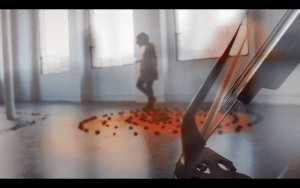
TÚ, YO, EL MUNDO
Después de cruzar puentes,
atravesar bosques,
nadar ríos,
salvar barrancos
y subir montañas,
llegamos a este páramo
donde no había nada
geográficamente destacable,
salvo un pino.
Y bajo su sombra
pasamos la tarde recostados.
Los mapas perdidos (Diputación Provincial de Soria, 2012)
You, Me, The World
Translated by John London
After crossing bridges,
going through forests,
swimming rivers,
walking over ravines
and climbing mountains,
we reached this bleak plateau
where there was nothing
of geographic interest,
apart from a pine tree.
And we spent the afternoon lying down
in its shade.
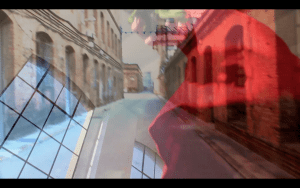
Concept & Direction: Hari Marini
Poetry: Beatriz Viol (Hallar la casa, Endymion 2018; Los mapas perdidos, Diputación Provincial de Soria 2012)
Translation: John London
Video production: Christos Rachiotis
Music: Fotis Karagiannis
Performers: Laura Martí Fandos, Hari Marini, Iro Michalakakou, Beatriz Viol
Special thanks: Barcelona Film Commission, Mireia Chavarria, Aina Martínez Martí, Panos Metaxas, Víctor Martínez Núñez, Sonia Rigola, Natasa Stamatari
Video installations / live performances:
- 7th International Video Poetry Festival, The Institute [for Experimental Arts], Void Network, Moving Poems, Embros Theatre, (Athens, December 2018) https://theinstitute.info/?p=3252
- Bring Your Own Performance, [ SPACE ] – Space Studios (London, July 2018)
- Urban Struggles in Mediterranean Cities: The Right to the City and the Common Space International (Un)Conference, School of Architecture, National Technical University of Athens (Athens, June 2018)
- Catalan Literature in English: An International Conference, Centre for Catalan Studies, Queen Mary University of London, FADS (London, September 2017)
- Peopling the Palace(s) Festival, Queen Mary University of London (London, June 2017)
- Solidarity NOT Charity curated by The Purple Ladies, Market Peckham (London March 2017)
- FLOW Spiral curated by The Saturday Museum (London March 2017)
Teasers:
- filmed in Barcelona https://youtu.be/hka9jIx1f9s
- filmed in Athens https://youtu.be/EYEwoa685ZU
- filmed in London https://youtu.be/AkVhf1BSMuo
Publications:
- Spirals: Genesis has been published in the online Catalan journal of poetry, Revista Kokoro, October 2017 http://www.revistakokoro.com/spirals.html
- Spirals: Paths of Her has been published in Interim: A Journal of Poetry & Poetics, Issue, Vol. 35, Issue 4, November 2018 https://www.interimpoetics.org/35-4/hari-marini-partsuspended
http://www.partsuspended.com/productions/current/spirals/
https://www.facebook.com/pg/PartSuspended/photos/?tab=album&album_id=10152641208907097